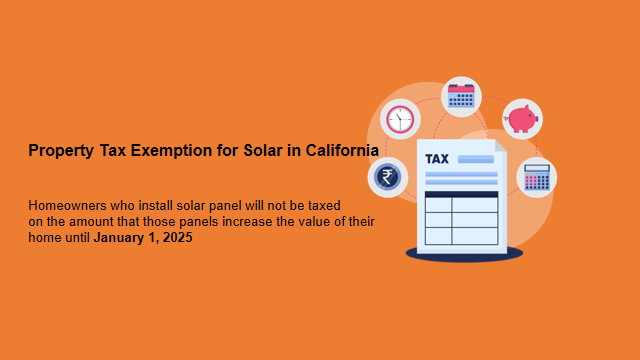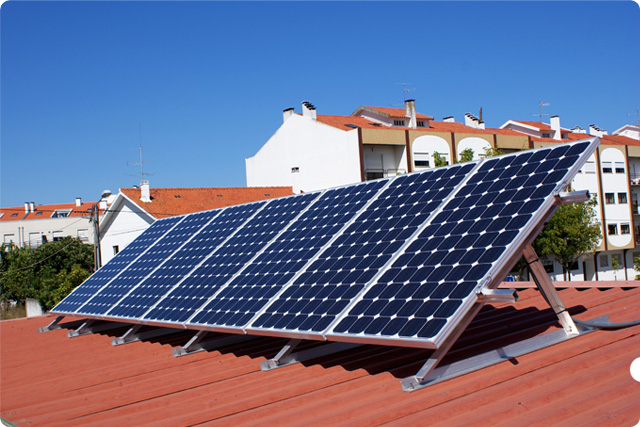The Golden State has long been a beacon of innovation and progress, and California is leading the way when it comes to harnessing the power of the sun. With plenty of sunshine and a commitment to sustainable energy solutions, it’s no wonder that more and more Californians are turning to solar power to reduce carbon emissions and save on energy costs.However, what many people may not realize is that the benefits of using solar power go beyond lower utility bills. Homeowners are reaping the benefits of property tax relief from solar installations. In this blog, we will cover the Property Tax Exemption for Solar in California, an important Solar Incentives.
Understanding the Property Tax Exemption for Solar in California
California has a property tax exemption for solar energy projects in the form of a new construction exclusion.
Property Tax Exemption for Solar in California means that homeowners who install solar panel california will not be taxed on the amount that those panels increase the value of their home until January 1, 2025. The installation of solar panels on a California home cannot increase (or decrease) the property’s tax assessment.
- The property tax exemption for solar energy projects is in the form of a new construction exclusion, which means that the installation of solar panels or other solar devices will not increase the assessed value of the property for property tax purposes until January 1, 2025.
- The exclusion applies to both residential and commercial properties and both new construction and additions to existing properties.
- The definition of an active solar energy system, which is eligible for the exclusion, is provided in California Revenue and Taxation Code Section 732. It includes systems that use solar energy for water heating, space conditioning, electricity production, process heat, or solar mechanical energy2. It does not include solar swimming pool heaters or hot tub heaters.
- The exclusion also covers storage devices, power conditioning equipment, transfer equipment, and parts related to the functioning of the solar energy system. However, the exclusion does not extend to the stage of conveyance or use of the electricity.
- The exclusion is valid until January 1, 2025, unless the Legislature extends it. The exclusion was first enacted in 1980 and has been extended several times since then. The current extension was signed by Governor Gavin Newsom in September 2023.
- The exclusion may not apply to some solar energy systems installed on leased land or leased building rooftops, depending on the terms and conditions of the lease agreement. A change in ownership or control of the solar energy system may also trigger a reassessment of the current value.

What can I benefit from a property tax exemption for solar in California?
Some of the benefits of property tax exemption for solar in California are:
You can save money on your property tax bill by installing solar panel California or other solar devices on your property, as they will not increase the assessed value of your property for property tax purposes until January 1, 2025. Your average monthly electric bill with solar panels will also be lower because of the overall tax savings.
You can also enjoy the environmental and economic benefits of using clean and renewable energy, such as reducing greenhouse gas emissions, lowering your electricity bills, and increasing your home’s value.
You can contribute to California’s efforts to meet its climate and energy goals, such as achieving 100% clean electricity by 2045 and reducing greenhouse gas emissions to 40% below 1990 levels by 20303.
You can take advantage of other incentives and programs that support solar energy in California, such as the federal investment tax credit, the California Solar Initiative, and the net energy metering program.
How to Claim the property tax exemption for solar in California?
The property owner or the initial purchaser of the building with a solar energy system must file a claim with the county assessor and provide any documents necessary to identify the value attributable to the solar energy system.
The claim form is available from the county assessor or the California State Board of Equalization.
How much can I save with this exemption?
The amount of property tax savings you can get with the exemption depends on several factors, such as the value of your solar energy system, the assessed value of your property, the property tax rate in your county, and the duration of the exemption. Here is a simple formula to estimate your annual property tax savings:
Annual property tax savings = Value of solar energy system * Property tax rate * Exemption factor
The value of your solar energy system is the amount that it adds to the market value of your property. This may vary depending on the size, quality, and performance of your system, as well as the local demand for solar energy. A common way to estimate the value of your solar energy system is to multiply the cost of your system by a factor of 0.8 to 1.01.
The property tax rate in your county is the percentage of the assessed value of your property that you have to pay as property tax. This may vary depending on the location, type, and use of your property, as well as the local tax levies and exemptions. You can find the property tax rate in your county by contacting your county assessor or visiting their website.\
The exemption factor is the percentage of the value of your solar energy system that is excluded from your property tax assessment. This is 100% until January 1, 2025, unless the Legislature extends the exemption. After that date, the exemption factor may be reduced or eliminated, depending on future legislation.
For example, suppose you install a solar energy system that costs $20,000 and adds $18,000 to the value of your property. Your property tax rate is 1.1%, and the exemption factor is 100%. Your annual property tax savings would be:
Annual property tax savings = $18,000 x 1.1% x 100% = $198
This means that you would save $198 on your property tax bill every year until January 1, 2025, as long as you do not change the ownership or control of your solar energy system. If you change the ownership or control of your solar energy system, your property tax assessment may be reassessed to the current value, and you may lose the exemption.
What is the difference between a property tax exclusion and an exemption?
A property tax exclusion and an exemption are both ways to reduce your property tax liability, but they work differently. An exclusion means that a certain amount or percentage of the value of your property is not subject to taxation. An exemption means that you do not have to pay any property tax on your property at all.
For example, in California, there is a property tax exclusion for solar energy projects, which means that the installation of solar panels or other solar devices will not increase the assessed value of your property for property tax purposes until January 1, 2025. However, there is also a homeowners’ exemption, which allows an owner to reduce property tax liability on a dwelling that is occupied as the owner’s principal place of residence by $7,000 of the full value of the property.
The difference between an exclusion and an exemption is important to understand because they can have a significant impact on your tax bill. Exclusions are typically limited to specific types of property or improvements, while exemptions are often based on your situation, such as your income, age, disability, or veteran status. To claim an exclusion or an exemption, you may need to file a form with your county assessor and provide any documents necessary to prove your eligibility. You can find more information about property tax exclusions and exemptions on your state or county website.
Referencing Official Resources
[California State Board of Equalization: Property Tax Exclusion for Solar Energy Systems]
[California Revenue and Taxation Code Section 73]
[California State Board of Equalization: Claim for Solar Energy System New Construction Exclusion]
[California Energy Commission: Property Tax Exclusion for Solar Energy Systems Extended]
[California State Board of Equalization: Solar Energy Systems Installed on Leased Land or Leased Building Rooftops]
[California State Board of Equalization: Change in Ownership of Solar Energy Systems]
[California State Board of Equalization: Frequently Asked Questions: Solar Energy Systems]












